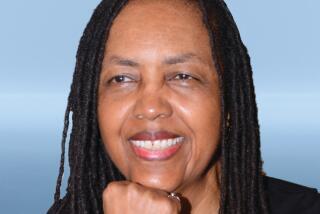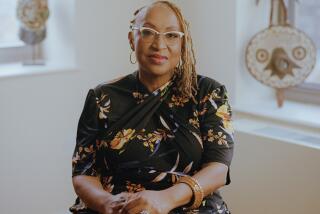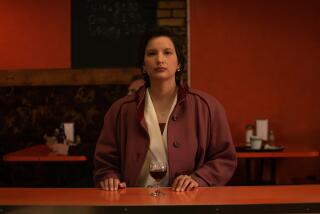‘The Good Lord Bird’ is a twisted take on an abolitionist’s story
John Brown, the white abolitionist who sought to free black slaves with the barrel of a gun, is a recurring character in American literature. He’s one of the ghosts that haunt Marilynne Robinson’s “Gilead,” and he’s the messianic, brooding prophet at the heart of Russell Banks’ epic “Cloudsplitter.” In the post-Civil War memoir of his contemporary, Frederick Douglass, Brown is a brave, principled man, with a plan to start a slave uprising that’s plainly suicidal.
In James McBride’s new novel, “The Good Lord Bird,” Brown is a comic figure, given to making religious speeches at strangely inappropriate moments. He’s a bit touched, frankly, and only the newest and unlikeliest member of his band of slavery-fighting renegades can see it.
It’s 1856 and “Little Onion” is a slave boy, age 11 or thereabouts. He ends up with “The Old Man” Brown thanks to an accidental encounter in a tavern in “Bleeding Kansas,” then the site of a smoldering war between bands of anti-slavery and pro-slavery fighters. Little Onion observes of Brown that “maybe he didn’t know his own self, for he was prone to stop on his horse in the middle of the afternoon, cup his hand to his ear, and say, ‘Shh. I’m getting a message from our Great Redeemer, who stoppeth time itself on our behalf.’”
McBride wrote three previous books, including the bestselling memoir “The Color of Water.” With “The Good Lord Bird,” he’s written a fast-moving farce that’s laugh-out-loud funny and filled with many wonderfully bizarre images. Its narrator, Henry Shackleford, a.k.a. Little Onion, is a baby-faced boy who spends almost the entire book in a dress. When Brown spots him, he’s dressed in rags, and Brown mistakes him for a girl. Little Onion is too scared of the white stranger to correct him.
As he travels with Brown, he discovers it’s easy to be a girl, because “a damsel out west on the trail could spit, chaw tobacco, holler, grunt, and fart, and gather no more attention to herself than a bird would snatching crumbs off the ground.” All the white people in his orbit buy Little Onion’s girl act, though most of the slaves see right through it. McBride thus gives us an apt metaphor for the failure of Americans to see the full humanity of the black slaves among them — and of the lengths slaves themselves would go to be seen as submissive. Putting Little Onion in a dress is a stroke of satirical genius. But it soon becomes apparent that McBride’s mission here is less satire than an adventure story with lots of broad and bawdy comedy.
Consider this exchange in which Brown comes to a Kansas town to rescue Little Onion — with guns blazing — after learning that the “girl” has been seen drinking with the customers in a whorehouse:
“Did you commingle with anyone in a fleshy way of nature without being married?” the outraged Brown asks, even as enemy bullets ping and whiz past him. “No sir,” Little Onion answers. “I am still clean and pure as the day I was born in that fashion.”
Those looking for verisimilitude or gravitas in their historical fiction might want to avoid “The Good Lord Bird.” McBride makes its clear he’s willing to kill just about any sacred cow to keep the humor going.
Douglass enters the novel about halfway through when Brown comes to live with the great abolitionist for two months in Rochester, N.Y. This is a true historical encounter. But the Douglass of “The Good Lord Bird” is a figure largely unrecognizable to those who love African American history. Among other things, he’s a lush and a lech. McBride’s portrait of Douglass felt downright sacrilegious to me.
Douglass calls Little Onion to his room, and it’s soon clear the great man’s intentions with the girl/boy are not pure. He gropes at her/him. They get drunk. “The more stupefied he got, the more he forgot about the hanky-panky he had in mind and instead germinated on what he knowed — orating,” Little Onion says. “First he orated on the plight of the Negro. He just about wore the Negro out. When he was done orating on them, he orated about the fowl, the fishes, the poultry, the white man, the red man, the aunties, uncles, cousins, the second cousins, his cousin Clementine, the bees, the flies…”
In “The Good Lord Bird,” the America of legalized slavery is a land of such moral vacancy even the country’s heroes are devoid of decency. The novel’s slaves have all learned to lie so much to white people that lying becomes part of their nature. “I never knowed a Negro from this day to that who couldn’t lie to themselves about their own evil while pointing out the white man’s wrong,” Little Onion says.
American novelists have given us great books that send people on journeys through slave-holding territory. Fifteen years ago, Charles Johnson won the National Book Award for “Middle Passage,” another novel with a wily black protagonist. And, of course, Mark Twain eviscerated the hypocrisy of the age in “Huckleberry Finn.” But both of those books were filled with larger doses of humanity than are to be found in “The Good Lord Bird.” McBride is a clever writer, and it’s fun to ride along with him — as long as you don’t mind running roughshod over history while doing so.
The Good Lord Bird
A novel
Riverhead: 434 pp., $27.95
More to Read
Sign up for our Book Club newsletter
Get the latest news, events and more from the Los Angeles Times Book Club, and help us get L.A. reading and talking.
You may occasionally receive promotional content from the Los Angeles Times.








